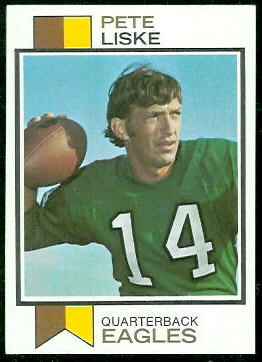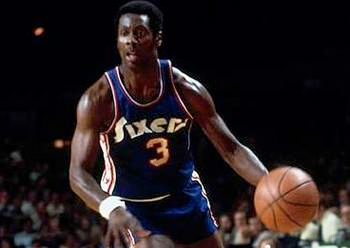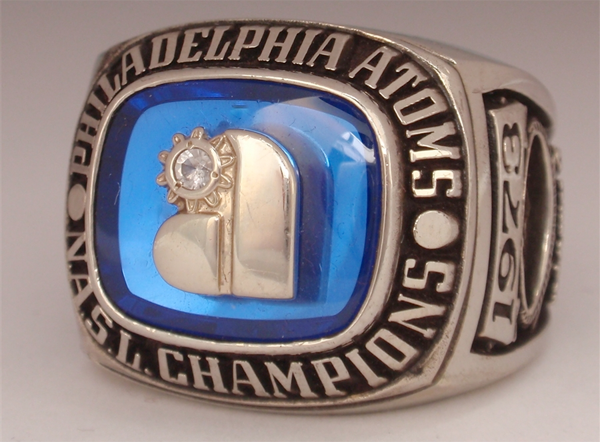August 25th is the 40th anniversary of the Philadelphia Atoms’ NASL championship win over the Dallas Tornado. PSP will be celebrating the Atoms and their historic inaugural season championship win with a series of articles in the run up to the anniversary. We begin with a survey of the Philly sports scene in 1973.
Forty years ago, magic happened here in the City of Philadelphia. A brand new team, made up of local kids and a handful of guys with funny accents, wearing shorts while kicking a ball around, managed to win the league championship in their first year of existence.
Along the way, those players captured the hearts of Philadelphia sports fans in a way that has rarely happened since.
The year was 1973…and the Philadelphia Atoms were really kind of special.
Sitting here, nearly half a century later, it is easy to wonder why. After all, Philadelphia sports teams had won titles before…and would soon be winning them again. What exactly was the big deal about this group of men playing a strange sport in a relatively minor league? What turned what would otherwise be an insignificant sporting event into the stuff of legend, with the players involved hailed as no less than folk heroes?
To get a sense, one needs to revisit the state of Philadelphia professional sports in the early 1970s…
Sports wasteland
In the spring of 1973, as the North American Soccer League season was about to commence, Philadelphia was suffering through an era of sports futility of epic proportions.

The Philadelphia Phillies’ season was about a month old. The previous season had seen the team once again finish in last place in the National League’s East Division, with a 59-97 record. However, hope sprung eternal—after all, “Super Steve” Carlton (he had not been christened “Lefty” yet) had managed to win the Cy Young Award with such a bad team, going 27-10, and he could be counted on to deliver another great season. Carlton would also have some help from new pitchers Jim Lonborg (himself a Cy Young Award winner in 1967, with Boston) and Ken Brett, acquired from Milwaukee in a trade for popular Phillies third baseman Don Money—and the Phils were confident a rookie named Mike Schmidt could fill his spot. New manager Danny Ozark could also look to returning stalwarts Deron Johnson, Willie Montanez, and Greg Luzinski to provide some offensive muscle.
By May, the Phillies were sitting at 9-10—not great, but much more competitive than in previous seasons. However, Carlton’s loss on May 1 not only dropped him to 4-3, but was the first of six straight losses for him, and seven losses in his next eight starts—he would finish the year 13-20, vilified by fans. Deron Johnson was traded on May 2, going on to help the Oakland A’s win a second-straight World Series title. Schmidt was a bust, finishing with a .196 batting average and 136 strikeouts in 443 at bats. There were a few bright spots: Luzinski delivered, belting 29 homers and 97 runs batted in, and right fielder Bill Robinson was a pleasant surprise, adding 25 homers. Ultimately, the team once again finished in the NL East basement, at 71-91.

U-N-C-L-E…
The 1972 Philadelphia Eagles season was also a stinker for the ages. The team regressed from a mediocre 6-7-1 record in 1971 to finish an abysmal 2-11-1, failing to make the playoffs for the 12th consecutive season—in other words, since the team’s 1960 NFL Championship. Quarterbacking the team were the forgettable Pete Liske (60.4 QB rating) and first round pick John Reeves (58.4 rating), and Po James was the leading rusher with only 565 yards. Wide receiver Harold Jackson was the team’s only offensive representative at the Pro Bowl…and he was traded in the off-season. There was no joy in the 700 Level.
Simply the worst
Fortunately there were winter sports to carry Philly fans from the disappointment of the Phillies and Eagles 1972 seasons to the spring of 1973, right?
Not really.

The 1972-73 season saw the Philadelphia 76ers put on the floor the worst team in NBA history. A mere six seasons after winning the NBA title with one of the best teams ever, the Sixers—severely weakened by the defection of Billy Cunningham to the American Basketball Association and relying heavily on an aging and injured Hal Greer—dropped the first 15 games of the season, and then later went on a 20 game losing streak en route to a putrid 9-73 record. This team still holds NBA records for fewest wins and most losses in a season, and its .110 winning percentage (or should that be .990 losing percentage) remained the worst in NBA history until the 2011-12 Charlotte Bobcats notched a .106 percentage in that lockout shortened season. Only guard Fred Carter managed to distinguish himself on a team with such luminaries as Leroy Ellis, Manny Leaks, and Freddy Boyd. Last in the NBA, last in overall attendance–the Worst Season Ever was mercifully over by March 25.
The “Nice Try” Boys
The lone bright spot on the City’s sports landscape was the Philadelphia Flyers. However, it must be recalled that they were not the Philadelphia Flyers yet. A brand new team in a city that was never known for pro hockey, the Flyers finished their sixth season in 1972-73 with their best-ever finish, at 37-30-11, good for second place in the Western Conference. Led by National Hockey League MVP Bobby Clarke and the hot goaltending of the ever-streaky Doug Favell, the Flyers won their first ever playoff series, defeating Minnesota in six games and upsetting the eventual Stanley Cup champion Montreal Canadiens in the opening game of the semi-finals before getting knocked out in the next four games, with the clincher on April 24.

While seen as a great run today, in 1973 it was just seen as “more of the same” by fans—at the time the “Second Six” expansion teams of 1967-68 always lost to the Original Six teams in the playoffs. Expansion team were dirty words, implying second rate teams struggling to catch up with the “varsity” sides.
To add insult to injury, on June 27, 1973 the very-popular Favell was traded to Toronto for Bernie Parent, a former Flyer who was nevertheless loathed by local fans because of his (literal) abandonment of the Philadelphia Blazers World Hockey Association team just before the playoffs over unpaid salary.
New team in a new sport
Against this backdrop, Philadelphians learned they were getting another expansion team (ugh) in a professional soccer league few knew about, and even fewer cared about. “Another struggling loser,” thought Philadelphia sports fans.
Little did anyone know they were in for a sports ride for the ages…
Click here to link to the rest of the series and more articles on the Atoms.


As someone who was alive in 1973, piss off with your “nearly a half century later”.
That is all.
LOL. Hey…I am there with you!
That makes three of us!
Hi… don’t forget Philadelphia Inters remarkable soccer team that won the UA Amateur Cup in 1973.